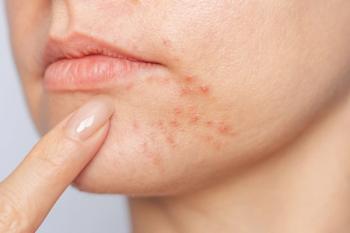
- Dermatology Times, September 2018 (Vol. 39, No. 9)
- Volume 39
- Issue 9
Are you equipped to identify depression in your acne patient?
“As dermatologists, we are trained in managing acne. We can provide early and effective treatment that improves the physical and psychological effects. It is up to us to bridge the gap between those suffering from acne and their access to medical treatment."
Of all dermatological conditions, acne vulgaris is the most common. While its outward affects are easily noticeable, the internal ones - reduced self-esteem, decreased self-image, and increased anxiety - often go undiagnosed. As a dermatologist, though, you can help reverse those effects.
In the United States, approximately 85 percent of adolescents and two-thirds of adults over age 18 struggle with AV. It’s presence, according to a literature review published in the International Journal of Women’s Dermatology, is associated with higher rates of depression, anxiety, social isolation, suicidal ideation, and suicide attempts. While women and individuals with severe acne vulgaris are most commonly affected, it can have significant negative impacts on anyone.
Of the affected group, 70-80 percent use self-prescribed topical treatments, but only between 5-28 percent seek care from a dermatologist. Patients with moderate-to-severe acne vulgaris (approximately 61 percent of them ) are more likely to pursue medical intervention. Overall, individuals with AV take an average of 22.2 months to see a professional.
You can alleviate the stress for patient who come to see you, the study authors wrote.
“As dermatologists, we are trained in managing acne. We can provide early and effective treatment that improves the physical and psychological effects,” the authors wrote. “It is up to us to bridge the gap between those suffering from acne and their access to medical treatment.”
Still, be prepared for up to half being unable to follow treatment plans due to financial reasons, the authors wrote.
ASSESSING ACNE VULGARIS
According to the literature review of 13 studies on acne vulgaris and self-esteem from 11 countries, nearly 90 percent of patients report feeling embarrassed by the condition. The earlier acne vulgaris shows up, the younger the age at which a patient will begin to report self-esteem and self-image problems. However, older adults aren’t immune to the societal implications of acne.
Middle school children are among the hardest hit with decreased self-esteem. Not only are they already dealing with changing hormones, but this age group is also prone to finding and latching on to reasons to socially isolate and reject someone. In fact, the authors report, moderate-to-severe acne vulgaris in this age group is linked to higher incidences of bullying and taunting, such as verbal and physical aggression, as well as social exclusion.
The authors also report nearly 62 percent of adults over age 18 experience increased embarrassment and greater self-consciousness if they develop acne vulgaris.
WHAT YOU CAN DO
According to the American Academy of Dermatology (AAD), one of the most important steps you can take is strengthening your relationships with primary care providers, encouraging them to refer their acne vulgaris patients to you as early as possible. To see satisfactory results, the AAD recommends these patients seek care in a medical setting.
In many cases, patients perceive their acne vulgaris to be far worse than it is, so you can answer their questions, allay their frustrations and fears, such as being afraid their acne vulgaris is contagious, and establish a therapeutic protocol. At their first appointment, have patients fill out forms that outline their self care so you know what steps they’re already taking to address their acne vulgarsis and where to go from there.
“Because both objective and subjective severity can influence a patient’s self-image, we recommend that patients evaluate their own acne vulgaris,” the authors wrote. “If they perceive their acne as being more severe than an objective examination suggests, a more aggressive approach in stepping up therapies to help them achieve their goals may be warranted.”
Even individuals with mild acne can benefit from an isotretinoin prescription, the authors wrote, because it not only improves the condition, but it has also been linked to reduced anxiety and depression, as well as augmented self-esteem. Be sure, though, to manage patient expectations about how long the medication will take to work and what differences he or she will be able to see in their skin’s appearance.
In addition, discuss camouflage techniques that can cover their ace vulgaris as a strategy to help reduce how noticeable the condition is.
SUICIDE
Patients suffering from moderate-to-severe ace vulgaris also face a two to three times greater risk of suicidal thoughts, the authors wrote.
While treating patients for these thoughts or suicide attempts is outside your medical purview, the authors did offer guidance on how to identify patients with these struggles. If you encounter patients exhibiting these behaviors, notify their primary care providers:
• Poor eye contact
• Angry or negative verbalization
• Poor self-care
• Poor hygiene
• Compulsive behaviors
• Self-mutilating behaviors
Ultimately, the authors wrote, the goal of treating ace vulgaris isn’t simply improving the skin’s outward appearance. It’s also addressing the emotional and psychological implications the condition can prompt with dermatologists being in a unique position to do so successfully.
“Perhaps most importantly, a dermatologist who prescribes appropriate medical therapy, manages patient expectations, and educates patients on the results and timing will best help meet patients’ medical and psychological needs,” the authors wrote. “Effective treatment improves patients’ self-esteem, and, as dermatologists, we have an armamentarium of treatment options to improve ace vulgaris.”
CITATION
Gallitano SM, Berson DS, How Acne Bumps Cause the Blues: The Influence of Acne Vulgaris on Self-Esteem, International Journal of Women’s Dermatology (2018). DOI:10.1016/j.ijwd.2017.10.004
Articles in this issue
over 7 years ago
Spironolactone as effective as antibioticsover 7 years ago
Psychological stress as acne causeover 7 years ago
Technology: A private practice’s best friendover 7 years ago
Lack of standardization?over 7 years ago
Update: Immunotherapy for melanomaover 7 years ago
A new treatment for seborrheic keratosis examinedover 7 years ago
Hidradenitis suppurativa and Crohn’s disease linkover 7 years ago
Clinical trials recruiting: Molluscum contagiousumover 7 years ago
Psoriasis lotion seeks FDA approvalNewsletter
Like what you’re reading? Subscribe to Dermatology Times for weekly updates on therapies, innovations, and real-world practice tips.












